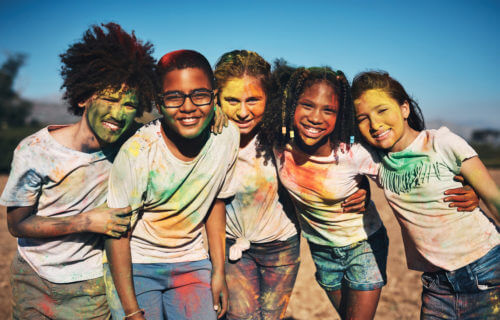GENEVA — Spending a little bit of time away from home may benefit kids in a big way, according to new research from the University of Geneva. Scientists report attending sleepaway summer camp can help promote essential socio-emotional abilities in kids such as the ability to control oneself, cooperate, or help others. In comparison to other adolescents who hadn’t attended camp, those returning from their time away displayed a notable increase in altruism.
Developing the capacity to recognize and manage one’s emotions, as well as the emotions of others, is a key aspect of growing up. These insights help us make important decisions that are beneficial to our own well-being and those of others, helping to build quality relationships with the people in our lives. Fostering the development of socio-emotional skills in kids beginning at an early age is very important, as they also help promote altruistic behavior and mitigate antisocial or confrontational decisions/actions.
Typically, these skills are picked up and honed across a variety of settings: school, family, or leisure. For this project, researchers chose to focus on sleepaway camps specifically.
“These overnight camps are spaces of socialization and experimentation, outside the family, which take place over a more or less long period of time and integrate all daily life. They involve permanent interactions with adults and other children, rich in informal learning. We wanted to show that such a context is favorable to the development of socio-emotional skills,” says Edouard Gentaz, full professor at the UNIGE’s Faculty of Psychology and Educational Sciences and at the Swiss Centre for Affective Sciences, in a media release.
Researchers wanted to ascertain to what extent participation at sleepaway camps may increase both adolescent altruism and self-esteem. Study authors also wanted to identify whether specific elements, such as going with friends or not, may make the experience more or less beneficial. A sample of 256 children between the ages of six and 16 were asked to complete a standardized questionnaire. Some of those kids had attended sleepaway summer camps, while some had not.
“Among the questions asked were, for example, ‘to what extent would you help a stranger find his way?’ or ‘to what extent would you help a friend with his homework?’. The possible answers ranged from ‘never’ to ‘very often’ on a five-point scale,” adds first study author Yves Gerber, a research and teaching assistant and PhD student.
Children answered these questions at both the beginning and the end of the camp experience.
‘‘The answers of the 145 children who took part in the camps were compared with those of the 111 children in the ‘control’ group who did not participate in this type of activity. These revealed an increase in the level of altruism in the former and a decrease in the latter,” notes study co-author Jennifer Malsert, a senior lecturer and senior research associate at the Psychology Section of the Faculty of Psychology and Educational Sciences at UNIGE.
Responses indicate positive prior camp experiences, or participating in this type of activity with friends, favors altruism development in this context. “As for the level of self-esteem, we observe that it remained stable in both groups of children. It is possible that this element is more stable than altruism and that its modulations are therefore less apparent. The response scale we used may not be specific enough to assess this,” Gerber explains.
In conclusion, researchers say their findings demonstrate the usefulness of sleepaway summer camps as a tool for developing socio-emotional abilities. Going away for just 10-15 days appears to promote increased altruistic intentions.
‘‘The next step will be to study the duration of the benefits obtained. It will also be a question of evaluating whether there is a correlation between the duration of the stay and the level of these benefits,’’ Edouard Gentaz concludes.
The study is published in PLoS ONE.
